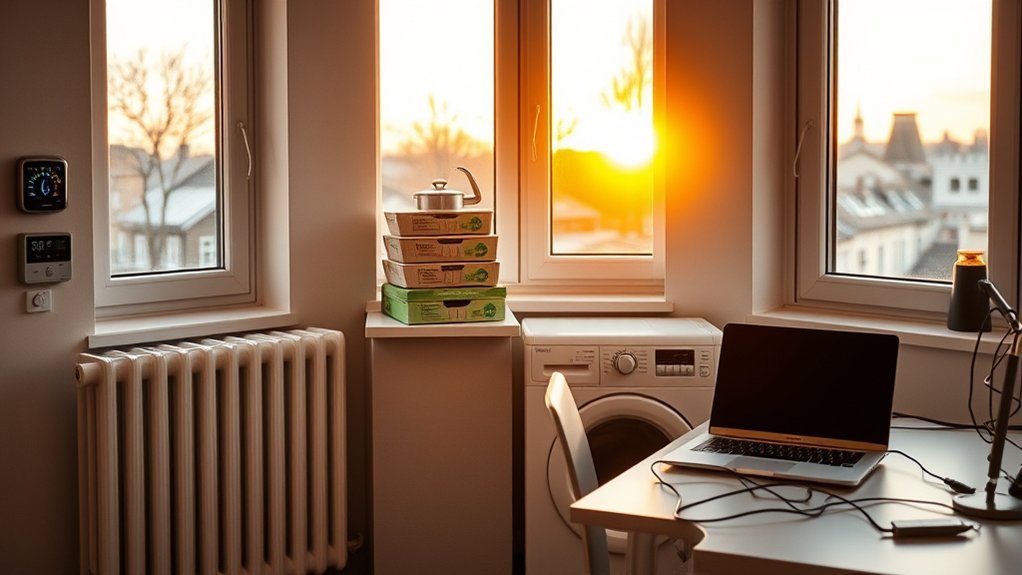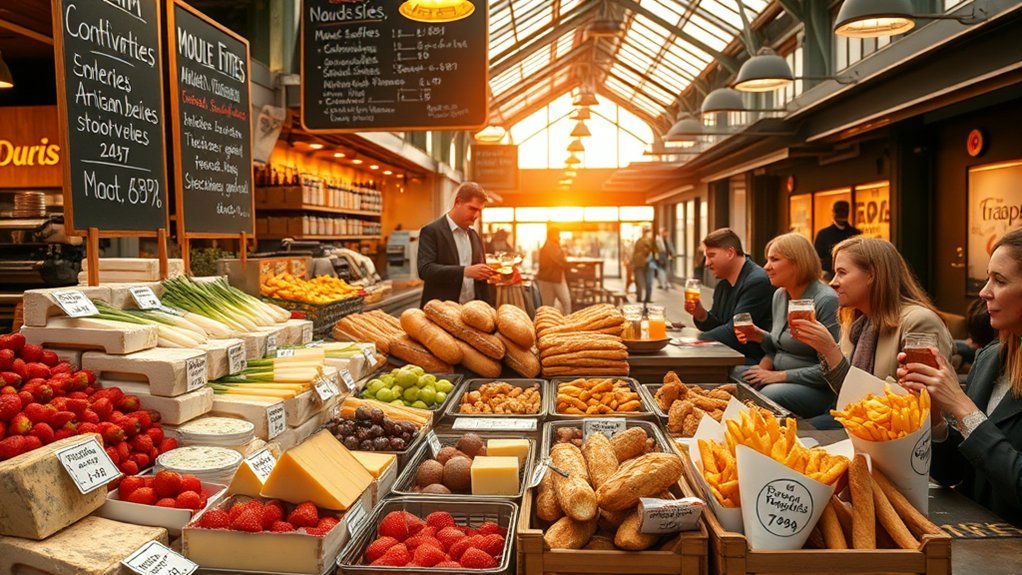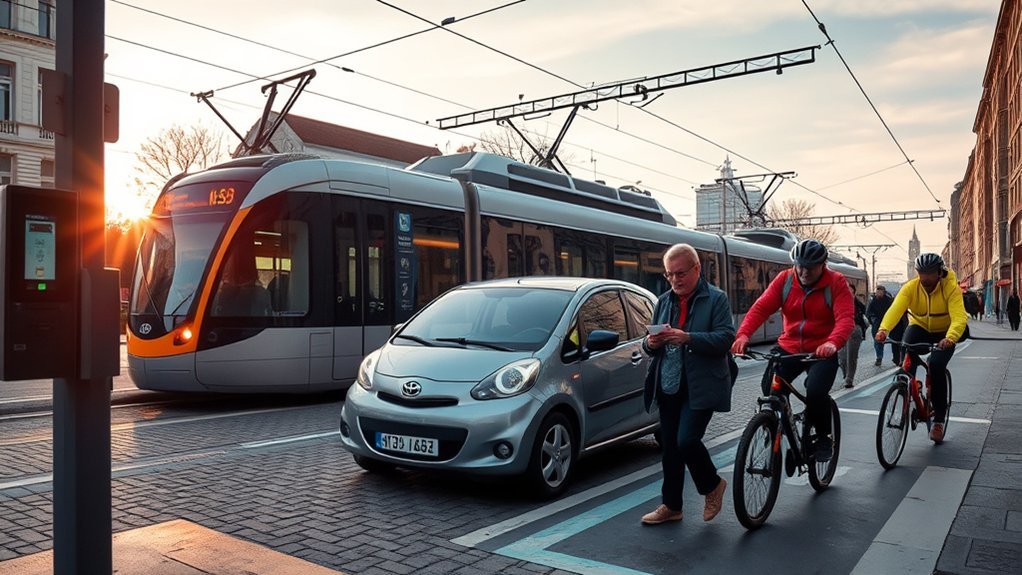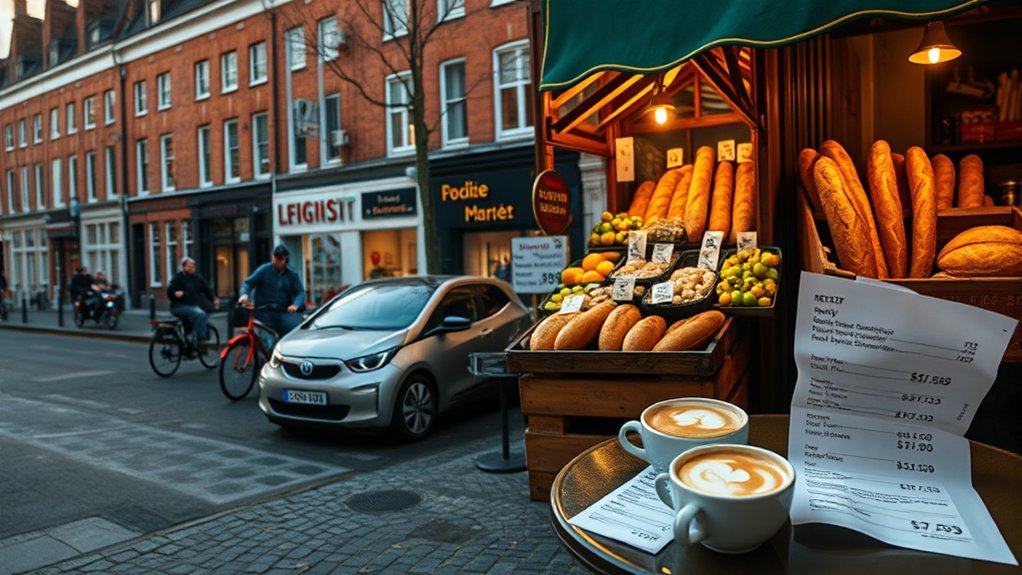You’ll typically need about €1,760 a month as a single person in Belgium, though Brussels and larger cities push rent and groceries much higher while places like Liège are cheaper. Couples usually spend €3,500–€4,000 monthly and a family of four around €4,500. Expect one‑bedroom rents from about €700 to €1,200, utilities €150–€300, and groceries €250–€400 per person. Keep reading to see detailed city, transport and savings tips.
Overview of Belgium’s Cost of Living and Regional Differences

Although Belgium’s overall cost of living sits high — it’s the 13th most expensive country in Europe — where you live makes a big difference: a single person’s average monthly spending is about €1,760, but rents alone vary from roughly €1,200 for a one-bedroom in Brussels to €920 in Ghent and €890 in Antwerp.
Belgium’s cost of living is high, but city matters — Brussels rents far exceed Ghent or Antwerp.
You’ll see that the national cost of living index masks regional contrasts: Brussels pushes averages up, while smaller cities and some Walloon areas come in lower.
When planning, compare average monthly rent against other living expenses like utilities (€150–€300) and groceries (around €235).
Childcare and local taxes can shift totals considerably — public daycare is income-based, private options can cost up to €800 monthly.
Use the index as a starting point, then tailor estimates to your chosen city and household size. That way you’ll budget more accurately and avoid surprises when rent and daily costs diverge across regions.
Monthly Budget Examples: Single, Couple, and Family of Four

Budgeting in Belgium gets clearer when you compare typical monthly totals: as a single person you’ll commonly spend about €1,760. Couples usually fall between €3,500 and €4,000 depending on lifestyle and location, and a family of four averages roughly €4,518.
You’ll use these average monthly expenses to plan food, transport, utilities and discretionary spending when living in Belgium.
- Single: €1,760 — covers essentials, modest groceries, public transport, basic leisure.
- Couple: €3,500–€4,000 — doubles many costs but gains shared savings on subscriptions and some bills.
- Family of four: ~€4,518 — includes larger grocery bills (often €800–€1,200), childcare or schooling extras.
- Key driver: rent and groceries — these create the biggest variance across cities and lifestyles.
These monthly expenses are practical benchmarks. Use them to tweak your budget: cut discretionary costs, choose different neighborhoods, or adjust grocery habits to match your financial goals while living in Belgium.
Housing and Rent Prices by City

When choosing where to live in Belgium, rent will quickly show you the difference between cities: in Brussels, expect higher housing costs — a one-bedroom in the city center averages about €1,200 per month.
If you’re weighing options, Ghent is noticeably cheaper, with similar one-bedrooms around €920, while Antwerp is slightly lower still at roughly €890. For the tightest budgets, Liège offers one-bedroom city-center units near €700.
You’ll use these figures to compare neighborhoods and decide what trade-offs you’ll accept: proximity to work, transit links, or extra space.
Rental prices reflect demand and amenities, so living in Brussels costs more but brings central access and services; Ghent and Antwerp balance affordability with urban life; Liège gives clear savings if you can compromise on some conveniences.
Factor these city differences into your housing search and monthly budget when planning a move within Belgium.
Utilities, Internet, and Household Expenses

You’ll typically pay roughly €150–€300 a month for utilities in Belgium, with an 85m² apartment averaging about €199 and city differences like €240 in Brussels versus €220 in Ghent.
Internet plans usually run €30–€50 monthly, and bundled offers for internet, TV and phone can cut costs compared with separate contracts.
Don’t forget routine household supplies and mobile plans when you budget, since they can add a noticeable €20–€50 or more each month.
Monthly Utility Bills
Expect to spend roughly €150–€300 a month on utilities for an 85m² apartment in Belgium, with an average bundle (electricity, heating, water, garbage) landing around €199.
You’ll find monthly utility bills vary by city, season and household habits, so compare utility costs against average salaries to judge affordability. Practical tips help you control bills.
- Electricity & heating: biggest drivers—insulation and heating type matter.
- Water & garbage: relatively stable, included in many bundles.
- Lifestyle add-ons: gym or extra appliances raise totals.
- Budgeting: aim for utilities to be under 10–12% of net income where possible.
This gives you a concise, comparative view to plan and reduce predictable household expenses.
Internet and Mobile Plans
Anyone moving to Belgium will find a competitive market for internet and mobile plans, so compare providers to match price, speed and coverage to your needs. You’ll see internet service costs in Belgium typically range €30–€50/month; speeds and bundles push prices higher. For mobile phone service, major providers Proximus, Orange and Base offer monthly plans €10–€40, averaging €20–€40. Prepaid options like Scarlet and Mobile Vikings start around €8/month, giving affordable options if you want flexibility. eSIMs are available from Proximus and Orange with activation fees from €10. Balance speed, data and contract length: if you need high-speed home internet and generous mobile data, expect the upper range; casual users can stick to cheaper or prepaid plans.
| Provider type | Typical range |
|---|---|
| Home internet | €30–€50 |
| Mobile plans | €10–€40 |
| Prepaid | ~€8 |
| eSIM fee | ~€10 |
Household Supplies Costs
After you’ve sorted internet and mobile plans, budget for the rest of the monthly household costs:
Basic utilities for an 85 m² apartment usually run about €199/month (with regional averages between €150 and €300), while internet adds roughly €30–€60 depending on speed and provider.
You’ll find household supplies and groceries in Belgium add predictable line items to monthly budgets, and they vary less than rent or other real estate costs.
- Utilities (electricity, heating, water, garbage): ≈ €199/month, regional €150–€300.
- Internet: €30–€60/month depending on speed.
- Household supplies (detergent, hygiene): small items like 3L detergent €4, tampons €5.29.
- Extras (gym, fitness): up to €82 in business districts; factor personal care into totals.
Food and Grocery Costs (Shopping and Eating Out)

You’ll find grocery bills for a single person typically run €250–€400 monthly, while a family of four often pays €800–€1,200.
Basics like a dozen eggs at €3.56 and 1 kg of tomatoes at €5.60.
Eating out is noticeably pricier—cheap meals cost about €15–€18, a mid-range dinner for two can hit €80, and a pub dinner may be around €47.
I’ll compare typical item prices, restaurant costs, and practical budget-shopping tips to help you stretch your food budget.
Grocery Price Breakdown
A quick grocery run in Belgium shows you can buy basic proteins and staples without breaking the bank: you’ll get a clear grocery price breakdown that helps compare costs in Belgium to other countries and plan everyday living.
Prices are practical and predictable for shopping.
- Eggs (12 large): €3.56 — reliable, budget-friendly protein.
- Tomatoes (1 kg): €5.60 — fresh produce can be pricier than imported fruit.
- Local cheese (500 g): €3.57 — dairy is affordable, especially local varieties.
- Apples (1 kg): €2.98 — fruit often undercuts vegetable prices.
A loaf of bread for two per day runs about €1.88, so staples stay reasonable for routine grocery shopping.
Dining Out Costs
Grocery shopping keeps your weekly food bill predictable, but eating out shifts the math: an inexpensive restaurant meal runs about €18 per person, while a mid-range dinner for two will set you back roughly €80, so you’ll want to plan which nights you cook and which you go out.
Dining out costs vary: a neighborhood pub dinner for two is closer to €47, while a good bottle of red wine adds about €12 if you buy one.
Supermarket prices (12 eggs €3.56, 1 kg tomatoes €5.60, 0.5 L domestic beer €2.22) make cooking at home significantly cheaper per meal.
Balance convenience and budget by comparing pub, inexpensive restaurant and mid-range restaurant options.
Budget Shopping Tips
One smart way to cut food costs is to combine weekly meal planning with shopping at local markets and sales—this lets you stretch a single-person monthly grocery budget of €250–€400 or a family’s €800–€1,200 further.
You’ll save by buying staples like eggs (€3.56 for 12) and potatoes (€2.84/kg) in bulk, and by choosing meals that reuse ingredients.
Compare eating a meal at an inexpensive restaurant (~€18) with cooking for two at home using market finds.
- Check weekly ads and build meals around discounted items.
- Buy seasonal produce at local markets for lower prices.
- Use bulk staples and freeze portions to avoid waste.
- Combine shopping trips with public transport to save time and fees.
Transportation: Public Transit, Cars, and Commuting Costs

In Belgium you’ll find efficient public transit and reasonably priced car ownership options that suit different commuting styles. For transportation you can rely on SNCB/NMBS trains and regional networks—De Lijn in Flanders, STIB/MIVB in Brussels, and TEC in Wallonia—so public transport covers most commutes.
A single fare runs about €2.50, while a monthly pass costs roughly €49, making monthly public transport often cheaper than driving for daily riders. Average monthly commuting costs are about €170 per person when mixing modes.
If you drive, expect average annual car costs near €1,212 (fuel, upkeep, basic insurance), but mandatory Third Party Liability insurance can add €60–€125 monthly depending on coverage.
Compare monthly pass vs. car insurance and fuel to choose: city dwellers usually save with public transport, while suburban or rural commuters may favor a car despite higher fixed insurance costs.
Plan routes and budgets based on frequency and distance to optimize costs.
Healthcare, Insurance, and Childcare Expenses

Healthcare in Belgium is affordable and well-structured, and you’ll find that routine costs stay relatively low thanks to mandatory insurance and generous reimbursements. You typically pay around €82 monthly healthcare expenditure per person, including mandatory contributions; health insurance membership averages about €8 per month, while annual mandatory costs range €50–€180. A GP visit after reimbursement is roughly €4, so primary care is accessible.
- Mandatory health insurance: low monthly fees cover essential services and reduce out-of-pocket spending.
- GP and specialist costs: reimbursements make consultations inexpensive compared with many countries.
- Public childcare: income-based fees average €136/month for low-income families, with subsidies available via Kind en Gezin and l’Office de la Naissance et de l’Enfance.
- Private childcare: expect €28–€32 per day, substantially higher than subsidized public options.
You’ll weigh convenience vs. cost: private childcare buys flexibility, public provision and subsidies keep family expenses predictable.
Salaries, Taxes, and How Income Compares to Living Costs

When you look at salaries in Belgium, it’s important to compare net versus gross pay since taxes and social contributions noticeably reduce your take-home income.
With an average net monthly income of about €2,428 against typical basic expenses near €1,565, you’ll see roughly €863 left for savings or discretionary spending.
However, high rents (e.g., €1,200 for a one‑bedroom in Brussels) can quickly erode that cushion.
Overall purchasing power in Belgium is higher than the EU average, which helps, but you should weigh gross-to-net differences and local prices to understand how far your salary will actually go.
Net Vs Gross Pay
Knowing your gross salary won’t tell you the whole story: Belgium’s hefty taxes and social contributions mean your take-home pay—about €2,428 monthly on average—can feel much smaller once you cover essentials.
You need to compare net vs gross pay to budget realistically, since average rent and monthly expenses eat into disposable income quickly.
Consider these figures when planning:
- Net monthly income: ~€2,428 after taxes.
- Typical monthly expenses (basic needs): ~€1,565, leaving ~€863.
- Average rent in Brussels (1‑bed): ~€1,200, which can wipe out most savings.
- Annual per‑person expenses: ~€20,121 (~€1,677/month), above EU average.
Use these comparisons to set realistic salary expectations and negotiate gross pay accordingly.
Purchasing Power Comparison
Although taxes and housing push your take-home pay lower, Belgium still gives you stronger purchasing power than much of the EU: average net income is about €2,428/month, leaving roughly €863 after basic monthly needs of €1,565, and a per‑person disposable income of about €28,997 annually versus the EU average of €20,350. You’ll find costs moderate: average housing cost is about €523 per person per month, which takes a solid slice of your budget. Inflation easing to 2.9% in 2025 should help purchasing power. Compared internationally, a family of four spends €4,518/month in Belgium (vs UK €5,338, US €3,755). Use the table below to compare key figures and plan how disposable income covers housing and other costs.
| Metric | Value |
|---|---|
| Net income (monthly) | €2,428 |
| Remaining after basics | €863 |
| Disposable income (annual) | €28,997 |
| Avg housing cost (monthly) | €523 |
Leisure, Gym, Education, and Everyday Services

If you factor in leisure, fitness and childcare costs, you’ll find Belgium offers a range of affordable to premium options depending on what you choose.
For leisure activities you can eat out or catch a film—dinner for two ranges from about €47 at a pub to €140 at a mid-range Italian, cinema tickets are ~€12 each, and top theater seats run ~€30 for two.
A gym membership averages €32/month, with budget chains like Basic-Fit from €19.99, so compare facilities versus price.
- Daycare: public fees €2.68–€37.87/day (income-based); private can reach €800/month.
- Early education: private preschool ~€568/year; international primary ~€15,751/year.
- Eating out: neighborhood pub €47; mid-range €140 for two.
- Entertainment: cinema €12/ticket; theater ~€30 for two.
You’ll balance convenience, quality and cost—choices determine whether services feel affordable or premium.
Tips for Saving Money and Finding Affordable Housing

When you’re hunting for affordable housing in Belgium, compare cities and neighborhoods carefully — places like Namur can cost roughly €1,226/month on average, versus Brussels at about €2,104 — and balance rent against transport and utility savings so you don’t trade one high expense for another. Look where rent in Belgium is lower and expect to pay around Namur’s average around €1,226 rather than Brussels’ premium. Use local markets to cut groceries (about €250/month) and get a monthly public transport pass for €49 to avoid car costs.
| Strategy | Typical saving |
|---|---|
| Move to cheaper city | Lower monthly rent |
| Shop local markets | ~€250 groceries |
| Use transit | €49 monthly pass |
Factor childcare (public daycare €2.68–€37.87/day) and energy efficiency (utilities ~€199/month for 85m²). Compare options, prioritize total monthly cost, and negotiate leases where possible.
Frequently Asked Questions
Is It Cheaper to Live in Belgium or the USA?
You’ll find Belgium cheaper overall: cost comparison shows lower living expenses, especially rent and groceries, so you’ll save monthly. Lifestyle differences matter, but for practical budgeting Belgium usually costs less than the USA.
Is It Expensive to Live in Belgium?
Not overly—Belgium’s cost of living is moderate: you’ll find average one-bedroom housing prices around €827 in city centers, grocery expenses typically €250–400 monthly, so compare transport, taxes and lifestyle to decide.
Can a US Citizen Live in Belgium?
Yes — you can live in Belgium if you meet visa requirements and secure residency permits; you’ll handle cultural adjustments, compare regional costs, and plan practically for paperwork, proof of funds, insurance, employment or study, and time for processing.
How Much Is a Gallon of Milk in Belgium?
Silky, steady savings: a gallon of milk in Belgium costs about €4.50. You’ll notice milk prices stay stable during grocery shopping, so it’s easy to do a quick cost comparison and plan practical purchases.
Conclusion
Living in Belgium feels like balancing a map of choices — cities sparkle with higher pay but steeper rents, smaller towns breathe affordability. You’ll compare budgets, weigh healthcare and childcare against wages, and pick utilities, groceries, and leisure that fit your rhythm. Practical tweaks — shared flats, local markets, seasonal cooking — trim costs fast. By tuning choices to region and lifestyle, you’ll turn Belgium’s mosaic into a home that’s both comfortable and within reach.


